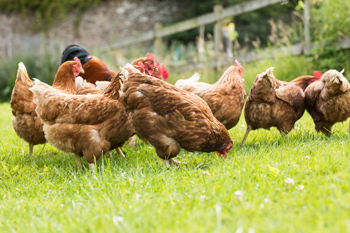Avian influenza has not currently been detected in Georgia. While the commercial poultry industry in Georgia has the greatest risk in terms of potential for loss, it also has multiple safeguards in place and has limited exposure to migratory birds. All commercial poultry flocks in Georgia are monitored prior to being transported and would not enter the food chain if the virus was detected. However, avian influenza can be introduced into Georgia through backyard chicken flocks.
Avian influenza is a highly contagious viral disease of birds and carried by wild birds, especially waterfowl. In many cases, waterfowl are simply carriers of the avian influenza virus and are not adversely affected. Avian influenza is an avian virus, not a human virus. The risk of contracting avian influenza from birds is extremely low since these viruses do not usually infect humans. You cannot get avian influenza from poultry and eggs that have been properly cooked. Scientific evidence has clearly proven that the process of cooking poultry meat and eggs destroys the virus.
To protect backyard chickens, the most important thing is to utilize good biosecurity on your property/farm.
Restrict access to your property/farm and birds. This includes domesticated pets, other livestock, rodents, and human traffic. Keep chickens inside a pen or coop and do not let them run free.
Wash and clean clothes, shoes, equipment and hands routinely when working with your flocks. Keep food in enclosed containers and protected from wild birds and pests.
Do not risk disease coming on your property/farm. Do not visit other poultry flocks or share equipment between farms.
Do not allow wild waterfowl to have contact with your birds or water your poultry from open water sources. Do not come back to your flock after duck hunting without proper biosecurity precautions.
Know the symptoms of avian influenza:
Sudden increase in bird mortality
Nasal discharge
Water and/or green diarrhea
Lack of energy
Swelling around the eyes, neck and head
Purple discoloration of wattles, combs and legs
Paralysis in turkeys
Twisting of the head/neck down under the body in turkeys
Georgia is prepared to handle avian influenza, but with proper biosecurity, hopefully we won’t have to.
If you have questions, feel free to contact the Fayette County Extension Office at 770-305-5412. If you suspect your flock is infected, call the Georgia Poultry Laboratory Network at 770-766-6850.













Leave a Comment
You must be logged in to post a comment.